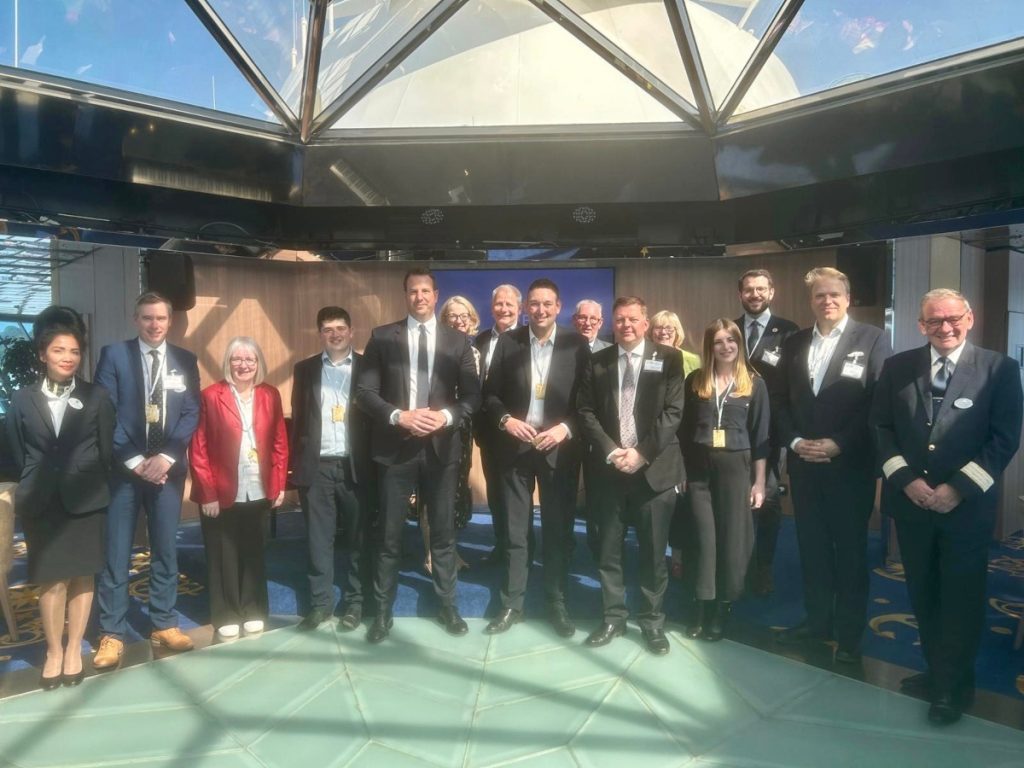CLIA and Fred Olsen Cruise Lines have demonstrated the economic value of cruise tourism by hosting Scottish politicians aboard the Balmoral.
This initiative aimed to highlight the benefits of the cruise industry to Scotland’s economy and discuss sustainable future objectives.
Showcasing the Value of Cruise Tourism
The collaboration between CLIA and Fred Olsen Cruise Lines has once again shone a spotlight on the economic contribution of cruise tourism to Scotland. By hosting Scottish politicians aboard the Balmoral, the industry aims to highlight the multifaceted benefits that cruise tourism provides to local economies. This visit underscores the critical role played by the cruise industry in promoting tourism in regions that are generally less travelled by international visitors.
Economic Impact and Industry Goals
The cruise industry represents a significant portion of Scotland’s tourism economy, a point emphasized during discussions with the delegation of MSPs. Andy Harmer of CLIA UK & Ireland noted the sector’s substantial economic impact across the UK. The industry’s activities not only enhance tourism but also create jobs and stimulate investment in local infrastructure. Reports show an increase in cruise passengers visiting unexplored areas, thereby spreading tourism benefits across a broader geographical range.
The industry’s commitment to pursuing net-zero emissions by 2050 was a notable topic during the visit. The transition towards sustainable operations is not merely a response to environmental concerns but also a strategic priority for long-term growth. Stakeholders are actively engaging in discussions to develop technology and infrastructure to support these ambitious goals.
Strengthening the Cruise Supply Chain
Paul Sweeney MSP, chair of the cross-party group for maritime and shipbuilding, highlighted the potential for strengthening Scotland’s cruise supply chain. Discussions centred on enhancing port facilities with green shore-side power and capturing more ship refit and conversion work.
Glasgow’s emerging role as a global hub for crew training was also addressed. The city’s universities and research institutions are poised to lead innovations in marine engineering and zero-emission ship propulsion systems. These developments are seen as critical to maintaining Scotland’s competitive edge in the evolving maritime industry.
The meeting further explored how collaboration with educational institutions could expedite technological advancements. By leveraging academic expertise, the industry hopes to address some of the technical challenges associated with zero-emission solutions.
Positive Collaborations and Future Prospects
The meeting between CLIA, Fred Olsen, and the MSPs sets the stage for progressive collaborations aimed at enhancing Scotland’s cruise sector. Both parties expressed optimism about the potential for further partnerships to deepen economic ties and foster innovation.
Efforts to improve port facilities and enhance the overall passenger experience for cruise tourists were key discussion points. The industry is also exploring opportunities to expand Scotland’s presence in global maritime forums.
Additionally, future initiatives may include joint ventures with other sectors, such as hospitality and transportation, to create a more integrated tourism experience.
Communicating Benefits and Innovations
Effective communication of the benefits brought by cruise tourism in Scotland was highlighted as essential. By showcasing economic advantages and innovative practices, the industry can strengthen public support.
The industry’s efforts to meet environmental targets include efficient resource management and advanced emission-reducing technologies. These initiatives are geared towards ensuring the long-term viability of cruise tourism in the region.
Stakeholders are committed to an open dialogue with local communities to align tourism growth with societal and environmental considerations.
Challenges and Opportunities
While the cruise industry presents numerous economic opportunities for Scotland, it also faces several challenges. Balancing growth with environmental sustainability remains a critical concern as the industry seeks to expand its presence.
The pursuit of innovation in green technologies is crucial in addressing these challenges. As the industry evolves, it must continually adapt to changing regulations and market demands.
Ongoing partnerships with academic institutions and technological firms are essential to drive the next wave of maritime advancements.
Conclusion
In highlighting the economic and social benefits of cruise tourism, CLIA and Fred Olsen have successfully emphasized the industry’s role in Scotland’s tourism sector. Through strategic partnerships and a commitment to innovation, the industry is poised to navigate both current challenges and future opportunities.
The joint initiative by CLIA and Fred Olsen not only showcased the economic importance of cruise tourism but also opened dialogues for future innovations. As the industry moves towards sustainable practices, it continues to reinforce its pivotal role in Scotland’s economy and tourism landscape.

